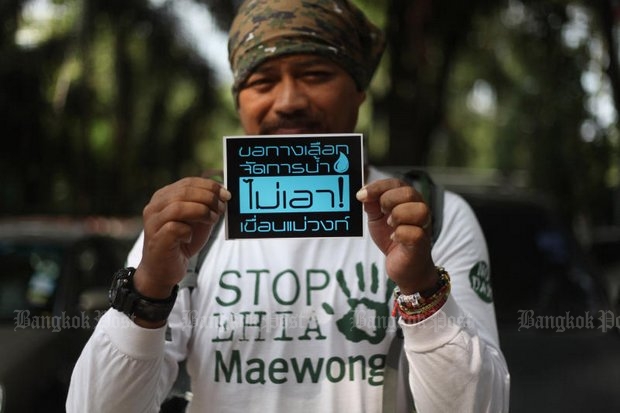
First it was speculation. Then, it became more real. The Mae Wong dam saga is probably making a comeback.And it may put an end to the marriage between the National Council for Peace and Order (NCPO) and the regime's staunch supporters who staged a campaign against the project during the previous government.
Anti-coup activists, meanwhile, have been watching and commenting on how high-profile environmentalists, whom they have branded as supporters of the 2014 coup, will react toward the revival of the controversial 13-billion-baht project recently unveiled by Agriculture and Cooperatives Minister Chatchai Sarikulya. The minister has been reportedly seeking to use an order under Section 44 of the interim charter to press ahead with the much-criticised project to build a dam inside Mae Wong National Park in Nakhon Sawan.
The pro-democracy activists were not overly biased when they made the point about the environmentalists being too lenient on the regime's excessive use of power, especially through Section 44.

Surasak Glahan is deputy oped pages editor, Bangkok Post.
Unlike other issues, the environmentalists and their followers will be less tolerant about the Mae Wong dam. The anti-Mae Wong Dam campaign is their poster child of success. Following a famous protest walk in 2013 from Nakhon Sawan to Bangkok by Sasin Chalermlarp, leader of the Seub Nakhasathien Foundation, the project was halted during the Yingluck Shinawatra government.
Anti-Mae Wong dam rhetoric had also been used against the Yingluck administration by some members of the People's Democratic Reform Committee (PDRC) during their street protests from November 2013 to May 2014 which eventually led to the military coup.
Even though Mr Sasin had denied he was an admirer of the regime, many PDRC supporters supported the coup and NCPO chief Prime Minister Prayut Chan-o-cha.
In the wake of the new push to revitalise the project, they are making noises about it. Mr Sasin has promised the prospect of street protests if it gets the go ahead. Hannarong Yaowalers, chairman of Thai-Water Partnerships and adviser to the People Networks on the North River Basins, also made the same call for the regime not to pursue it. Well-known artist Vasant Sitthiket has cautiously and softly echoed his opposition.
The NCPO risks clashing with its own supporters and losing its political support if it goes ahead with the project.
The prospect that Gen Prayut as head of the NCPO will use his special powers under Section 44 to revive the project has concerned its opponents since last year.
Since the beginning of this year, the NCPO has issued a number of orders bypassing checks and balances and fast-tracking megaprojects. These include an order that bypasses land-zoning laws to speed up the government's plan to create special economic zones.
Another order issued in March has allowed state utility projects to go ahead with getting contractors on board while their environment and health impact assessments are not yet completed. The diktat benefits megaprojects involving public transportation, state hospitals and irrigation, including the Mae Wong dam.
Mr Sasin and other environmental groups in March submitted a joint letter to the premier explaining why the Mae Wong dam should be shelved. Gen Prayut then responded in a more diplomatic way, saying further study on its pros and cons would be required. That led environmentalists to heave a temporary sigh of relief.
Even though there was fierce opposition from environmental groups and local people against those orders, none of them became widespread enough to trigger the possibility of street protests.
Given his popularity, Mr Sasin's vow to stage a protest gives the regime reason to worry if it decides to open old wounds.
Despite claims it will help irrigate more than 300,000 rai of farmland and minimise floods, the Mae Wong dam has faced opposition as there are fears it could damage a fertile forest complex which serves as buffer zone for the Huai Kha Khaeng Wildlife Sanctuary. Many suggested an alternative type of water management.
For decades, the Royal Irrigation Department has pushed the Mae Wong dam project during several governments. As Gen Prayut and his government have pledged to solve environmental woes such as forest encroachment, invoking Section 44 to fast-track this and other irrigation projects does not seem to make sense at all. The regime's excuse that these projects will not get the green light if their environmental and health impact studies fail is not logical. Fewer people buy the idea.
Environmental and health impact studies usually take time. Waiting for their completion is needed because adverse effects on the environment and people are irreversible.
At the moment, Mr Sasin has adopted a wait-and-see approach; however, for him and many supporters of the NCPO, if the regime stamps its seal of approval on the project it will prove very hurtful.
